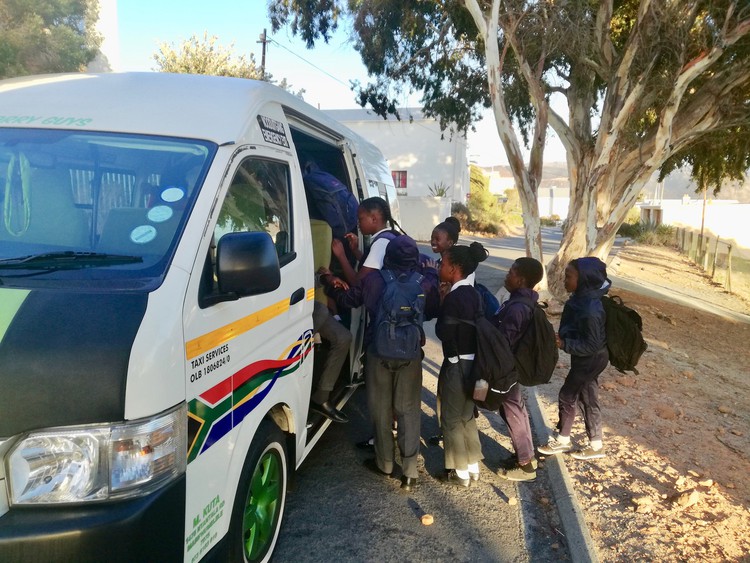Owners shocked as school transport vehicles impounded
Masiphumelele owners say they were not told about enforcement of permit
A number of Masiphumelele residents who transport learners to schools in the area have had their vehicles impounded during February for not having valid permits.
Every school day, many students from Masiphumelele are driven to Simon’s Town High School, 13 kilometres away. The drivers say they have been doing this for years and they have never been asked for permits before. Instead, they carried a letter from the school and another letter signed by parents, giving them permission to transport the students.
One of the school transport owners is Nozizwe Bozo. Both of her cars were impounded in February. She has managed to get one released.
Drivers are fined R2,500 for not having the correct permit and R7,000 to get the car released from the pound. These fines increase if the car is impounded a second and third time.
Bozo says, “I have been doing this business for over 10 years now, and not once was I told about a permit over that period. As long as my car was roadworthy and the driver had all the necessary papers, it was good.”
Another owner, Limyike Xazana, says, “We do not understand why only now our cars get impounded after so many years.”
Xazana has applied for a permit.
But Councillor Brett Herron, Mayoral Committee Member for Transport, said last year the City embarked on a three-month programme to inform parents, crèches, schools and operators, through their ward councillors, about the National Land Traffic Act (NLTA).
He said ignorance of the regulations “does not absolve” drivers, “whether they were informed via the City’s awareness campaign or not”.
Asked why the permits had apparently not been enforced for many years by the City, Herron says the City and provincial enforcement agencies had enforced the NLTA and its regulations since December 2009.
But Anele Siwalanga, who transports children from Nyanga and Gugulethu, says he too has for years been producing the agreement letter from parents and the school when stopped. He also says drivers had not been informed that they must apply for permits.
“We have never been called to meetings by the principals and the ward councillors to tell us that we need to apply for permits. The only meetings they call us to is to tell us not to hoot, because we are making a noise for the neighbours,” says Siwalanga.
Siwalanga says he applied for a permit, but it has cost him. “I was driving a 1997 car that was still in good condition, but they [City] refused [a permit], saying that they only take cars from 2005,” says Siwalanga.
In 2015, he bought a 2010 car and applied for a permit. He is still waiting. The car purchase has put him in debt. “The City is making money out of us; they don’t give us the permits, but give us tickets and take our cars,” says Siwalanga.
Luzuko Makhala has been transporting children in Langa for five years. He says he applied for a permit in January and he has not received any feedback.
“What the City needs to understand is that unlike taxi drivers, we do not make money every day. We are paid monthly and therefore it is very difficult to pay R9,500 [R2,500 fine plus R7,000 release fee] to release a car, because some of us do not even make that much money,” says Makhala.
He says he has been lucky not to have had either of his two cars impounded yet.
“We drop off the children halfway and walk with them to the school so that they [traffic officials] do not take [impound] our cars,” says Makhala.
Support independent journalism
Donate using Payfast

Don't miss out on the latest news
We respect your privacy, and promise we won't spam you.
Next: Our toilets haven’t worked for four years, say Mbekweni shack dwellers
Previous: Architects’ institute dismisses De Lille’s complaint about professor’s comments
Letters
Dear Editor
There are more important issues than permits. I regularly see overloaded bakkies with an open back and visible exhaust fumes, smooth tyres and small children jumping around while the vehicle is moving. I have seldom seen a seat belt on anyone and am concerned that learners too young to sit in the front are also not secured.
Young children are dropped on blind corners where it is difficult for them to cross safely. They often run to cross behind the vehicle where they can't be seen by incoming traffic.
Surely a vehicle should only be impounded if it is unsafe? Fines should be reduced when the vehicle has been restored to a roadworthy state.
© 2017 GroundUp. 
This article is licensed under a Creative Commons Attribution-NoDerivatives 4.0 International License.
You may republish this article, so long as you credit the authors and GroundUp, and do not change the text. Please include a link back to the original article.

